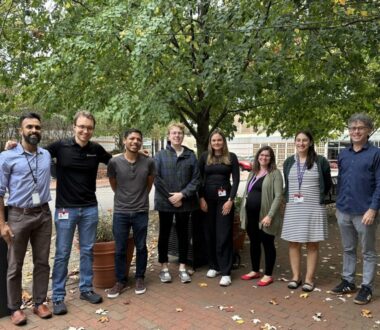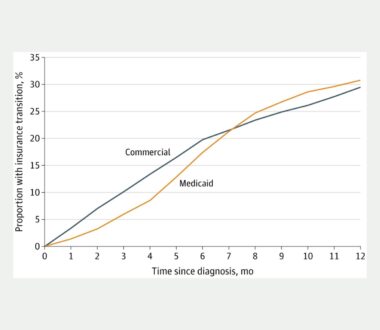
Offering Buprenorphine in Homeless Shelters in Massachusetts Projects Life- and Cost-saving Results
Overdose is the leading cause of death among people with opioid use disorder (OUD) who are experiencing homelessness. Innovative care models that meet this population outside of office-based settings can improve access to buprenorphine, a medication for treating OUD, and avert fatal overdoses. In this study, Avik Chatterjee, lead author and addiction specialist at Boston […]

We’re barely using a key resource to help people with addiction
Rachel was making her 25th visit to the emergency department. The wound on her leg from injecting drugs had spread to her entire calf and required a lengthy course of antibiotic treatment in the hospital. The few times she had been admitted to the hospital, she had left without finishing treatment because the pain and […]

Catching Up with Pilot Grant Recipients Sierra Castedo de Martell and Bulat Idrisov
In preparation for the 11th cycle of CHERISH pilot grants that is now open, former pilot grant recipients Sierra Castedo de Martell and Bulat Idrisov joined CHERISH Pilot Grant Director Brandon Aden, Senior Research Program Manager Jared Leff, and Communications Manager Bonnie Tse online to meet prospective applicants. Attendees raised questions about eligibility, the pilot […]

Cost-Effectiveness of Fibrosis Staging
More than 4 million people in the U.S. live with a hepatitis C virus (HCV) diagnosis. However, as of 2022, fewer than one-third of individuals infected with HCV have been cured due to barriers related to high direct-acting antiviral (DAA) pricing and the steps involved in determining someone’s degree of liver disease or fibrosis. In […]

A Cost-Effectiveness of Implementation Facilitation to Promote Emergency Department–Initiated Buprenorphine for Opioid Use Disorder
In the last eight years, emergency departments (EDs) have seen an influx of visits related to opioid use disorder (OUD). For the same reason, researchers have been citing EDs to be a critical setting and reachable moment for initiating OUD medications, the gold standard of care. Buprenorphine is advantageous as a low-barrier OUD treatment compared […]

Racial and Ethnic Disparities Along the Hepatitis C Care Cascade Among Priority Populations
Over the last two decades, injection opioid use has increased among reproductive-aged women, with resultant increases in mother-to-child hepatitis C virus (HCV) transmissions in the U.S. Direct-acting antiviral (DAA) treatment is highly effective at reducing and eliminating the risk of HCV transmissions. Yet, studies show lower odds of receiving DAA treatment for women compared to […]

Announcing the 10th Pilot Grant Cohort Advancing the Treatment of Substance Use Disorders, HCV, and HIV
CHERISH is excited to welcome a new pilot grant cohort for the 10th year. Spearheaded by CHERISH Pilot Grant Program Director Brandon Aden, the program is designed to help researchers gain familiarity with health economic evaluations, apply related methodologies to their pilot research, and build out the next stage of their careers. This year, CHERISH […]

Economic Costs and Outcomes that Matter to Patients
One of the key questions researchers ask when conducting an economic evaluation is: How much does this intervention cost to an individual, organization, or society at large? The process requires researchers to identify the perspectives of affected stakeholders and analyze the costs related to the intervention. To better understand the burdens and economic impact of […]

Improving Care for Opioid Use Disorder in the Criminal-Legal System
Substance use disorders (SUD), and especially opioid use disorder (OUD), are prevalent within the criminal-legal system. Recently, there has been increased alignment of OUD care across the criminal-legal system with the patient-centered American Society of Addiction Medicine guidelines. Whether by choice or through legislation, carceral facilities are increasingly offering FDA-approved medications for OUD (MOUD), which […]

Off-hours with Andria Eisman, a Clinical Practitioner-turned Implementation Science Researcher
CHERISH Research Affiliate Andria (Andi) Eisman first connected with the Center for Health Economics of Treatment Interventions for Substance Use Disorder, HCV, and HIV (CHERISH) over a site visit to New York City. At the time, she was a 2021 Implementation Research Institute (IRI) Fellow at the Brown School of Social Work at Washington University […]

Insurance Instability for Patients with Opioid Use Disorder in the Year After Diagnosis
Access to health insurance is crucial to gaining the necessary diagnostic and therapeutic services to achieve and maintain good health. Insurance is especially necessary to access medications for opioid use disorder (MOUD) as the cost of MOUD can be a barrier to staying in treatment. If insurance coverage is disrupted, MOUD treatment may be more […]

Intern Spotlight: Noah Jenkins and Simrun Rao
At the start of summer, we welcomed undergraduate students Noah Jenkins and Simrun Rao. As rising seniors, Jenkins and Rao have been selected as part of the Summer Undergraduate Mentored Research (SUMR) Program at University of Pennsylvania and the NIDA Summer Research Internship Program. Working alongside CHERISH investigators Zachary Meisel at the Leonard Davis Institute […]
Engage with CHERISH
Submit a Consultation Request or Contact Us to learn more about how CHERISH can support your research or policy goals.